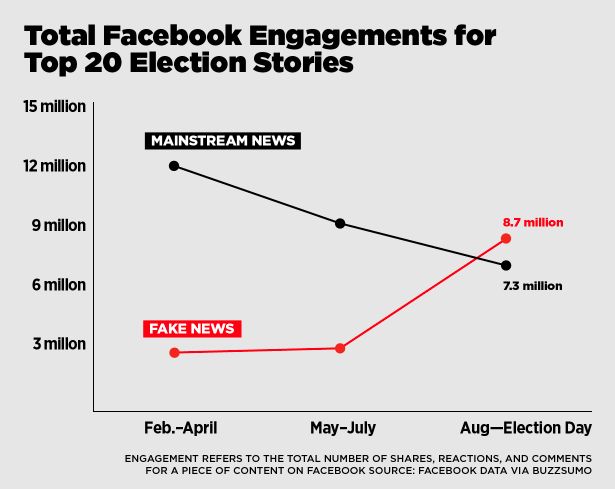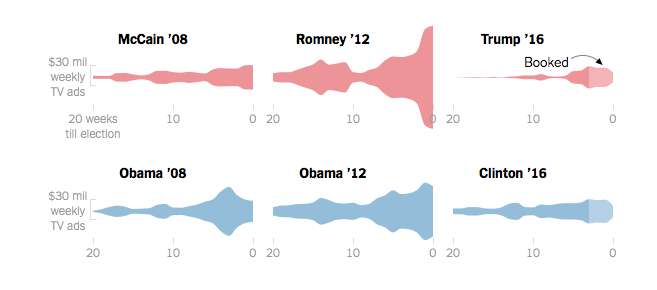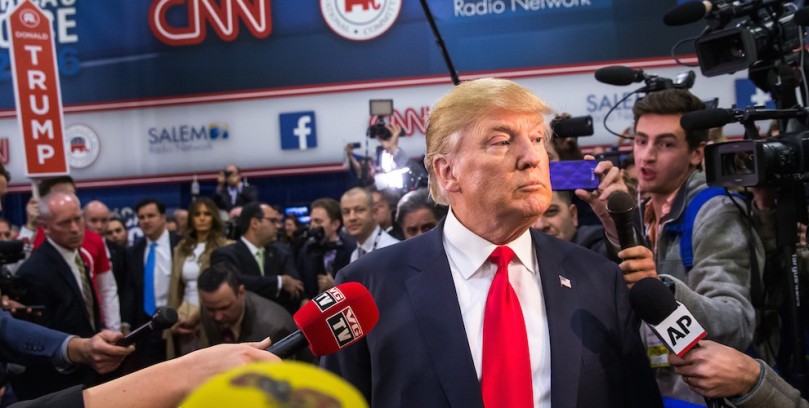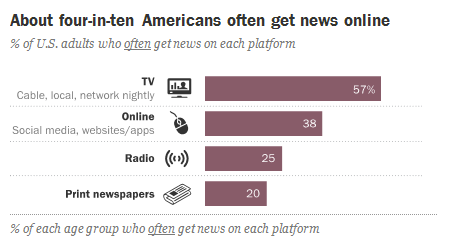Here’s a chart by BuzzFeed showing the overwhelming prevalence of fallacious news stories during the presidential campaign. In the final three months leading up to Election Day, the 20 best-performing false election stories from fake and hyperpartisan fringe sites generated more shares, comments, and likes on Facebook than the 20 best-performing stories from the major news sites.

In light of the flood of misinformation, Facebook has pledged to remove advertisements from sites that put out misleading information.
“We have updated the policy to explicitly clarify that this applies to fake news,” a Facebook spokesman said in a statement. “Our team will continue to closely vet all prospective publishers and monitor existing ones to ensure compliance.”
In a world where more than three in five Americans get their news from social media, with more than two in five getting it specifically from Facebook, social platforms have a lot of leverage in controlling the distribution of content. Nearly resistant to face-checking or other evaluations of the truthfulness of its content, fake news articles have the potential to spread among link-minded communities of individuals. It’s a vicious feedback loop, one that keeps glowing the embers of our political divisions.
Researchers say that the heavy consumption of partisan news contributes to political ignorance. A study, published in the Journal of Computer-Mediated Communication, argues that online ideological news exposure is driving a wedge between facts and beliefs. Analyzing survey data from the 2012 presidential election, the study authors found that frequent use of the Internet to acquire information was linked with a number of high-profile misperceptions, including erroneous beliefs about weapons of mass destruction in Iraq and the birthplace of President Barack Obama.
“The emergence of the Internet as a primary source of political information has transformed many Americans’ experience of the news, giving voice to previously marginalized political factions and creating outlets for explicitly ideological reporting,” said the authors. It raises fundamental questions about the prospect of an informed electorate.
Today, the Washington Post interviewed a fake news writer, whose articles have circulated on Facebook throughout the election. Paul Horner, the 38-year-old proprietor of a “Facebook fake-news empire” has been behind a string of successful viral hoax stories in recent years. His stories, the Post writes, have even been linked to by Donald Trump’s son Eric and once-campaign manager Corey Lewandowski. Now, Horner says he might have played a role in getting Trump elected.
“My sites were picked up by Trump supporters all the time. I think Trump is in the White House because of me,” he said. Horner said his articles were popular because Trump’s supporters had no interest in validating the information.
“He just said whatever he wanted, and people believed everything, and when the things he said turned out not to be true, people didn’t care because they’d already accepted it. It’s real scary. I’ve never seen anything like it.”
Horner certainly deserves blame for feeding the beast. People’s political identities are notoriously resistant to dissonant information. They are more likely to seek out news that accommodates their preexisting outlook on the world. Misinformation is like a drug that enables addiction- once hooked, it’s impossible to be weaned off. Lies take the place of well-grounded facts; truth becomes obscured in an hyperpartisan ecosystem with no boundaries.
There’s ample evidence to suggest that some groups are more vulnerable than others to this phenomenon. In fact, Republican who viewed conservative news sites were more likely to believe lies than those who visited liberal sites, according to the study cited above. Denizens of conservative sites were ten times more likely than non-viewers to believe misleading information. Democrats who visited liberal sites were a bit more than three times more likely than non-visitors to hold misinformation. The vulnerability to fake news is bipartisan, but it skews more to conservative Internet surfers.
And it certainly doesn’t help when the President-Elect calls a notorious conspiracy theorist and promoter of wildly false news “amazing.” Alex Jones, provacateur and operator of Infowars.com, said that Trump also called him to thank him for his and his audience’s support.





